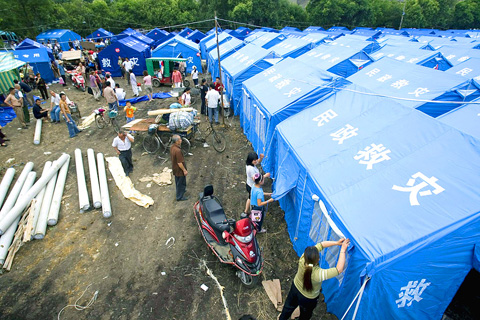Nearly 200,000 people have been evacuated and more than 1 million others warned to be ready to leave quickly as Chinese authorities prepare to drain a lake formed by a devastating earthquake.
The lake, called Tangjiashan, formed above Beichuan town in the Mianyang region of Sichuan Province when a hillside plunged into a river valley during the May 12 quake.
Xinhua news agency said work on a runoff channel from Tangjiashan had been completed. It quoted Yue Xi, deputy chief of the water and electricity section of the People’s Armed Police, as saying the channel “is expected to discharge flood water” between today and Tuesday.

PHOTO: EPA
The confirmed death toll from China’s worst quake in three decades was raised yesterday to 68,977, an increase of about 120 people from a day earlier. Another 17,974 people were still missing, the State Council said. The daily increase was the smallest since the government started announcing death tolls shortly after the quake hit.
Xinhua said “a total of 197,477 people were evacuated to safe ground as of 8am Saturday.” It did not say how the number was determined. Some of the people may have been in the path of the planned runoff.
State television showed bulldozers and other heavy earth-moving equipment working on the water diversion channel. It did not show how far up the landslide the channel had been carved.
Xinhua said that Tan Li, the Communist Party chief of Mianyang, had issued another order for all 1.3 million people in the area to be evacuated if “the barrier of the quake lake fully opens” and floods the area.
There was no sign that the banks of the lake were about to burst.
Tangjiashan is the largest of more than 30 lakes that have formed behind landslides caused by the quake, which also weakened man-made dams in the mountainous parts of the disaster zone.
Millions of people in Sichuan are already living in tent camps and prefabricated housing, which have taken on the tone of new villages.
In Mianyang, about 200 families left their camps in flood-prone areas of the city and moved to higher ground in a wooded park on Fule Mountain.
Most had camping tents and shelters made from tarpaulins pitched under trees amid ornate gazebos and tea houses with traditional sloping yellow-tiled roofs. Red signs on the buildings said, “Dangerous building, don’t come near.”
Xinhua also reported that President Hu Jintao arrived yesterday to check on relief efforts in Shaanxi Province.
He was shown on state TV at a shelter talking to children who had been left homeless by the earthquake.
Another province hit by the earthquake, Gansu, plans to complete its rebuilding by the end of 2010, the governor said yesterday. The earthquake killed more than 360 people in Gansu.

MORE VISITORS: The Tourism Administration said that it is seeing positive prospects in its efforts to expand the tourism market in North America and Europe Taiwan has been ranked as the cheapest place in the world to travel to this year, based on a list recommended by NerdWallet. The San Francisco-based personal finance company said that Taiwan topped the list of 16 nations it chose for budget travelers because US tourists do not need visas and travelers can easily have a good meal for less than US$10. A bus ride in Taipei costs just under US$0.50, while subway rides start at US$0.60, the firm said, adding that public transportation in Taiwan is easy to navigate. The firm also called Taiwan a “food lover’s paradise,” citing inexpensive breakfast stalls

TRADE: A mandatory declaration of origin for manufactured goods bound for the US is to take effect on May 7 to block China from exploiting Taiwan’s trade channels All products manufactured in Taiwan and exported to the US must include a signed declaration of origin starting on May 7, the Bureau of Foreign Trade announced yesterday. US President Donald Trump on April 2 imposed a 32 percent tariff on imports from Taiwan, but one week later announced a 90-day pause on its implementation. However, a universal 10 percent tariff was immediately applied to most imports from around the world. On April 12, the Trump administration further exempted computers, smartphones and semiconductors from the new tariffs. In response, President William Lai’s (賴清德) administration has introduced a series of countermeasures to support affected

CROSS-STRAIT: The vast majority of Taiwanese support maintaining the ‘status quo,’ while concern is rising about Beijing’s influence operations More than eight out of 10 Taiwanese reject Beijing’s “one country, two systems” framework for cross-strait relations, according to a survey released by the Mainland Affairs Council (MAC) on Thursday. The MAC’s latest quarterly survey found that 84.4 percent of respondents opposed Beijing’s “one country, two systems” formula for handling cross-strait relations — a figure consistent with past polling. Over the past three years, opposition to the framework has remained high, ranging from a low of 83.6 percent in April 2023 to a peak of 89.6 percent in April last year. In the most recent poll, 82.5 percent also rejected China’s

PLUGGING HOLES: The amendments would bring the legislation in line with systems found in other countries such as Japan and the US, Legislator Chen Kuan-ting said Democratic Progressive Party (DPP) Legislator Chen Kuan-ting (陳冠廷) has proposed amending national security legislation amid a spate of espionage cases. Potential gaps in security vetting procedures for personnel with access to sensitive information prompted him to propose the amendments, which would introduce changes to Article 14 of the Classified National Security Information Protection Act (國家機密保護法), Chen said yesterday. The proposal, which aims to enhance interagency vetting procedures and reduce the risk of classified information leaks, would establish a comprehensive security clearance system in Taiwan, he said. The amendment would require character and loyalty checks for civil servants and intelligence personnel prior to